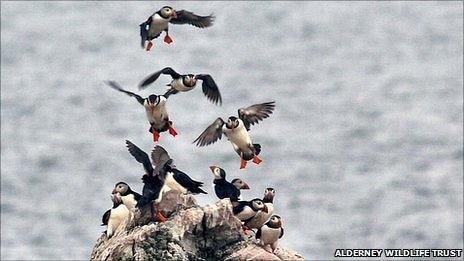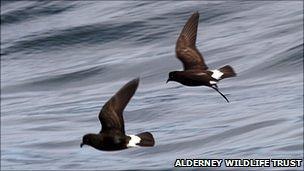Storm petrels on Burhou viewed through infrared camera
- Published

The introduction of the Petrel Cam follows the success of the Puffin Cam
The tiny island of Burhou in the Channel Islands has been fitted with an infrared camera to watch a colony of secretive storm petrels.
The aim of the Alderney Wildlife Trust is to allow an insight into the lives of the birds, which mostly nest in pebble beaches or old stone walls.
Burhou is half a mile north west of Alderney.
The island's population of petrels dropped from 30,000 pairs in 1959 to between 60 and 200 pairs in 2000.
The camera follows the successful introduction of Puffin Cam, which is also based on Burhou, in 2009.
European storm petrels are a sea-going species and only return to land to breed.
The breeding birds often feed on surface waters close to shore in intertidal zones near to their colony.
The trust works with the South East Grid for Learning, which works with schools in the south east of England and the Channel Islands, to help with the camera's use as part of the curriculum.
Roland Gauvain, manager of the Alderney Wildlife Trust, said: "Puffin Cam has been a great Channel Islands' project with a good core following, yet in the past the limitations of previous technology has limited its usefulness.

Storm petrels spend most of their time at sea and only return to land to breed
"Camera speeds have dramatically increased and whilst we hope to have full live streaming from the island in 2012, the addition of Petrel Cam to the project will be a world first."
A temporary infrared sensitive camera has been installed and the images it collects will be manually added to the Puffin Cam website.
The trust hopes to replace it with an automatic night sensitive camera so it will show puffins during the day and petrels at night.
It also has plans to use the camera to show other nocturnal observations, including to try and film pufflings (fledgling puffins) emerging from the burrows and making their way to the sea for the first time.